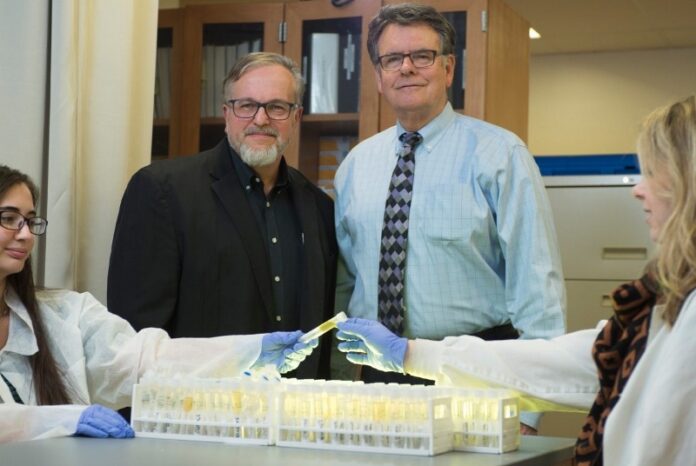
A Virginia Tech Carilion Research Institute project focused on the opioid epidemic will receive $1 million in combined grant funding, according to a Dec. 4 announcement by the Virginia Biosciences Health Research Corp., also known as Virginia Catalyst.
Warren Bickel, the Virginia Tech Carilion Behavioral Health Research Professor and director of the VTCRI Addiction Recovery Research Center, will collaborate with project leader F. Gerard Moeller, a professor of psychiatry, pharmacology and toxicology, and neurology at VCU School of Medicine, and colleagues from Inova Fairfax Hospital, and pharmaceuticals company Indivior.
The partners will embark on an 18-month Phase Three clinical trial to study an investigational medication-assisted behavioral intervention intended to prevent opioid users from relapsing after they recover from an overdose.
“The institute’s researchers are developing innovative approaches to end the problem of repeated opioid overdoses during addiction treatment,” said Michael Friedlander, executive director of the Virginia Tech Carilion Research Institute and Virginia Tech’s vice president for health sciences and technology. “VTCRI scientists are determined to find scientifically sound, practical solutions to the nation’s most pressing health problems.”
The White House recently declared a public health emergency to deal with the problems of opioid use. More than 140 Americans die every day from an opioid overdose, according to the Centers for Disease Control and Prevention. According to the Virginia Health Department, more than 800 patients died from opioid overdose in Virginia in 2015.
“We know that treatment programs work when they combine medication with continuing addiction health care and support,” said Bickel, whose research since 1983 has helped lead to opioid replacement therapies currently in use.
But repeated overdoses are a continual problem.
The Phase Three clinical trial, led by Moeller, who directs the VCU Institute for Drug and Alcohol Studies, will test a new treatment protocol that involves follow-up support and a novel once-a-month formulation of a medication developed by pharmaceuticals company Indivior.
With Robert Lipsky, director of translational research in the Department of Neurosciences at Inova Fairfax Hospital, patients will be recruited into treatment immediately after they recover from an overdose.
Treatment will begin in the emergency room, with an active referral and transportation to an outpatient clinic, where patients would receive the investigational treatment and meet with a behavioral therapist.
Bickel, who is also a professor of psychology in the College of Science, will lead the VTCRI-based part of the study.
He will collaborate with John Burton, chair of the department of emergency medicine, and Robert Trestman, senior vice president and chair of psychiatry, both with Carilion Clinic and the Virginia Tech Carilion School of Medicine.
“When people go into withdrawal, they use drugs,” Bickel said. “We hope to eliminate withdrawal symptoms and block the brain’s opioid receptors, preventing people from getting high or continuing to abuse opioids. When people show up at the emergency room, once they recover from an overdose, we will get them counseling without a delay. Every participant will have a cell phone and if anybody needs help, they can call. We hope to show the number of repeat overdoses will fall.”
Friedlander said the project has the potential to become a model for other cities and states to employ as an effective program to stop the merry-go-round of opioid use-recovery-relapse.
“Seeing such sound, transdisciplinary science put to the task of giving people a chance to have productive lives, especially after emergency resuscitation from opioid overdoses that so often are followed by a relapse, is an inspiring example of the Virginia Tech motto, Ut Prosim,” Friedlander said.
Funding for the bioscience commercialization project includes $500,000 from Catalyst matched with $500,000 from Indivior.
“This is a great example of the VTCRI continuing to build a robust statewide collaborative neuroscience research network and growing the strength of the academia-industry biomedical research enterprise in the commonwealth,” Friedlander said. “With these types of collaborations, the Virginia Tech Carilion Health Sciences and Technology campus will continue to catalyze entrepreneurial partnerships and move brain research discoveries from the laboratory to patient care.”
The Virginia Biosciences Health Research Corp. is funded from the Virginia General Assembly’s General Fund and six participating research universities: Eastern Virginia Medical School, George Mason University, Old Dominion University, University of Virginia, Virginia Commonwealth University, and Virginia Tech.


